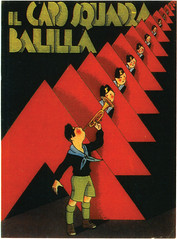
Ernst Nolte, in his seminal "Fascism In Its Epoch" (English version, "Three Faces of Fascism," Holt Rinehart and Winston, NY, 1965) opens with a "First Definition" of Fascism that he then spends the rest of the book refining and elaborating.
First DefinitionSuperficial though it may be, this survey of the phenomenon and its interpretations to date enables us to arrive at a preliminary definition which will serve as a guide and at the same time be subjected to study and demonstration within the analysis.Neither anti-parliamentarianism nor anti-Semitism is a suitable criterion for the concept of fascism. It would be equally imprecise to define fascism as anti-communism, but it would be obviously misleading to use a definition which did not adequately stress, or even entirely omitted, this basic criterion. Nevertheless, the identifying conception must also be taken into account. Hence the following suggests itself:
Fascism is anti-Marxism which seeks to destroy the enemy by the evolvement of a radically opposed and yet related ideology and by the use of almost identical and yet typically modified methods, always, however, within the unyielding framework of national self-assertion and autonomy
[Footnote: In its isolated form the definition lays no claim to originality. The basic paradox is already contained in the term "conservative revolution." Gustav Adolf Rein, in Bonapartismus und Faschismus (Göttingen, 1960), describes fascism as counter-revolution on the soil of revolution. The definition comes to life only within the framework of the study as a whole.]This definition implies that without Marxism there is no fascism, that fascism is at the same time closer to and further from communism than is liberal anti-communism, that it necessarily shows at least an inclination toward a radical ideology, that fascism should never be said to exist in the absence of at least the rudiments of an organization and propaganda compatible to those of Marxism. It enables us to understand the extent to which there can be stages of fascism: according to the evolution of the ideology and the predominance of one of its two chief components, the pseudo-socialist or the elite — that is, race — element; according to the degree of determination in, and the more or less universal nature of, the will to destruction; and according to the energy of execution. The decisive factors, however, are starting point and direction, for this concept is a "teleological" one, and even the most marked differentiation of stages does not do away with the unity of its essential nature.Finally, this definition enables us to make concrete distinctions and identifications: neither the Pan-Germans nor Stoecker's Christian Socialists come under it; on the other hand, there is no reason to maintain that every opponent of Hitler in his party or in the other groups of the extreme Right was a non-fascist.






No comments:
Post a Comment